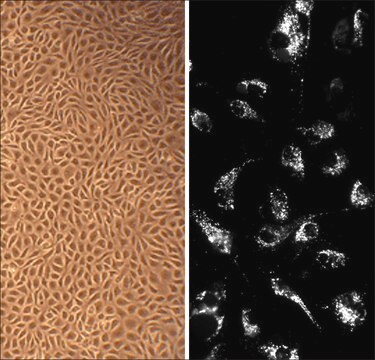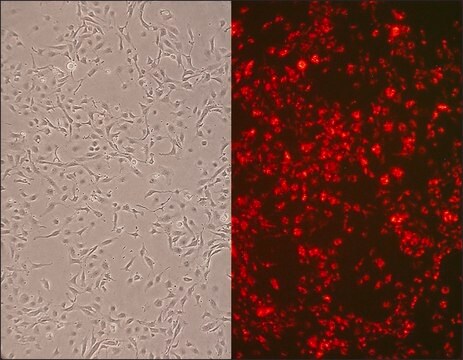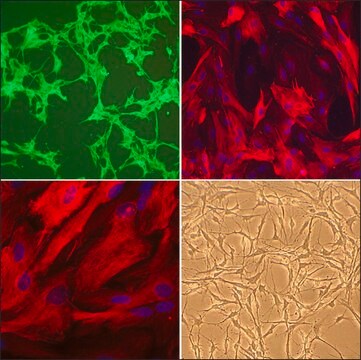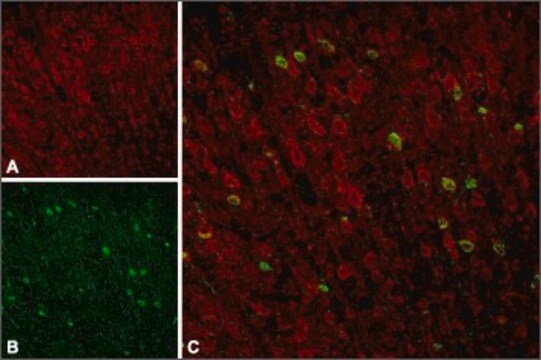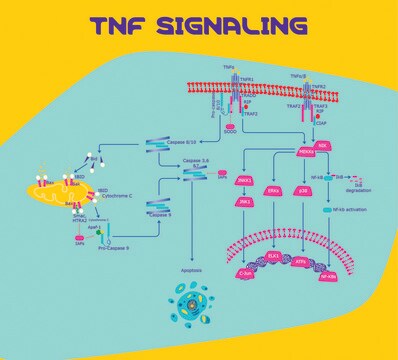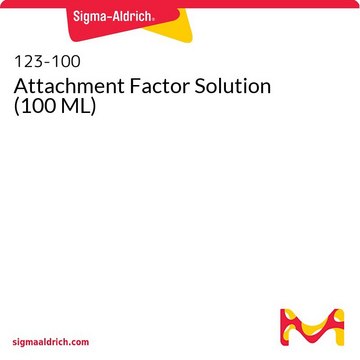推荐产品
生物源
bovine brain (microvessels)
品質等級
包裝
pkg of 500,000 cells
製造商/商標名
Cell Applications, Inc
增長模式
Adherent
染色體組型
2n = 60
形態學
Endothelial
技術
cell culture | mammalian: suitable
相關疾病
acquired immunodeficiency syndrome/human immunodeficiency virus (AIDS/HIV); ischemia/reperfusion injury
運輸包裝
dry ice
儲存溫度
−196°C
相关类别
一般說明
Lot specific orders are not able to be placed through the web. Contact your local sales rep for more details.
BBMVEC provide an excellent model system to study many aspects of endothelial function and disease, especially those related to the blood-brain barrier (BBB).
BBMVEC have been utilized extensively in research, for example to:
BBMVEC provide an excellent model system to study many aspects of endothelial function and disease, especially those related to the blood-brain barrier (BBB).
BBMVEC have been utilized extensively in research, for example to:
- Show, along with Bovine Aortic Endothelial Cells, that brain microvasculature is more sensitive to pathogenesis, compared to large vessel endothelia, by demonstrating that C-reactive protein (CRP), a cardiovascular risk factor, induces higher oxidative stress in the brain microvasculature due to higher local expression of the CRP-receptors CD16, CD32 and of the NAD(P)H-oxidase subunit p22phox (Closhen, 2010) and that brain microvascular endothelial cells show higher sensitivity to oxidative stress generated by advanced glycation end products due to stronger VEGF expression leading to increased permeability (Niiya, 2006, 2012); illustrating another difference between endothelia, alkalosis was shown to activate ERK in aortic, but not brain microvascular endothelial cells (Motz, 2006)
- Show that stronger blood-brain barrier (BBB) function can result from shear stress which acts through VE-cadherin mediated activation of Tiam/Rac1 pathway (Walsh, 2011) which in turn leads to upregulation of occludin and ZO-1 expression and increases their localization to tight junctions (Colgan, 2006, 2007) and by fluvastatin, which activates NO synthase and causes NO-dependent dephosphorylation of endothelial MLC via the MLC phosphatase (Kuhlmann, 2006), and is able to prevent glutamate-induced damage to the BBB (Kuhlmann, 2008); conversely, BBB breaks down under hypoxic conditions and as the result to CRP exposure due to MLCK and NADPH-oxidase activation, indicating that increased contractility and oxidative stress are involved in development of post-stroke brain edema (Kuhlmann, 2007, 2009)
- Support the key role of ROS by showing that activation of antioxidant genes by Nrf2 reduces brain vascular leak from acute high altitude exposure known to induce ROS (Lisk, 2013);
- Determine that IL-1β, ZYM, and LTA increase the permeability of the BBB to small ions, while TNF-α and lipopolysaccharide disrupt the endothelial layer integrity to allow passage of larger molecules (Pyrgos, 2010)
- Investigate the role of basolateral environment in modulating BBB by regulating expression and biochemical properties of the tight junction proteins, occludin and ZO-1 (Colgan, 2008)
- Show that during cerebral ischemia increased expression of TWEAK and Fn14 in the endothelial-astrocyte interface facilitating leukocyte transmigration and recruitment to the ischemic tissue (Haile, 2010)
- Study the mechanisms of BBB penetration by fungal pathogen Cryptococcus neoformans during invasive cryptococcosis (Stie, 2012a, b)
- Demonstrate opposite effects of two osteoponin isoforms on the angiogenesis in the in vitro capillary assay and VEGF secretion by endothelial cells (Blasberg, 2010)
- Demonstrate that apigenin, a dietary flavonoid, activates Ca2+-activated K+ channels in endothelial cells leading to a hyperpolarization followed by a Ca2+ influx causing increased NO production followed by Akt dephosphorylation (Erdogan, 2007);
- Investigate the mechanisms of accumulation and effects of amyloid deposits on brain vasculature in cerebral amyloid angiopathy (Kandimalla, 2009; Agyare, 2013)
- Develop gene and drug delivery methods for crossing the BBB based on polymer-based nanoparticles (Agyare, 2008; Gil, 2009, 2012) or adenovirus or gold nanoparticles modified to be transported via transcytosis pathway (Tang, 2006; Prades, 2012), as well as to improve the general drug loading/delivery stealth dendrimer carriers (Yang, 2008)
細胞系來源
Microvessels
應用
endothelial function, growth factor expression, cell permeability, tight junction study, endothelial layer integrity, leukocyte transmigration, angiogenesis, in vitro capillary assay, growth factor secretion, K+ channel study, drug development
成分
Bovine Brain Endothelial Cell Basal Medium containing 10% FBS & 10% DMSO
準備報告
- 2nd passage, >500,000 cells in Bovine Brain Endothelial Cell Basal Medium containing 10% FBS & 10% DMSO
- Can be cultured at least 12 doublings
例行更新培養
Please refer to the BBMVEC Culture Protocol.
儲存類別代碼
11 - Combustible Solids
水污染物質分類(WGK)
WGK 3
閃點(°F)
Not applicable
閃點(°C)
Not applicable
商品
Technical information for working with bovine brain microvascular endothelial cells including thawing, subculturing and cryopreservation
我们的科学家团队拥有各种研究领域经验,包括生命科学、材料科学、化学合成、色谱、分析及许多其他领域.
联系技术服务部门
